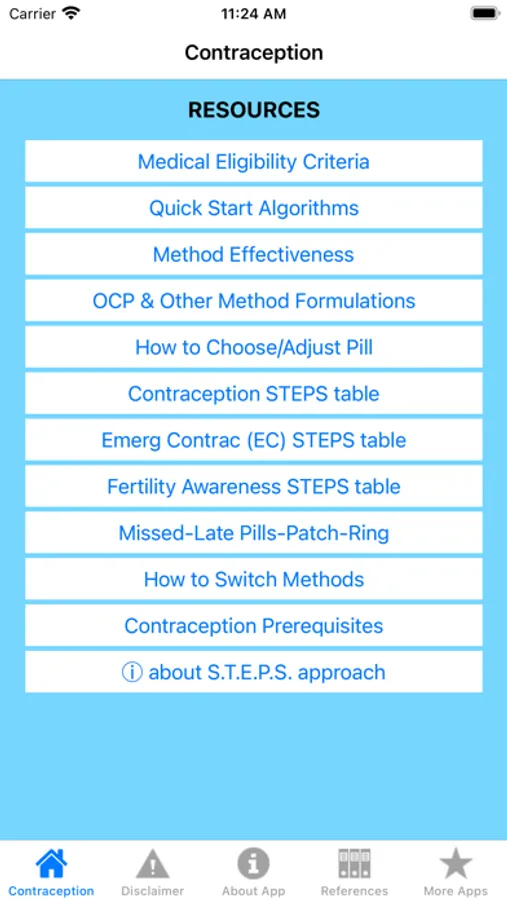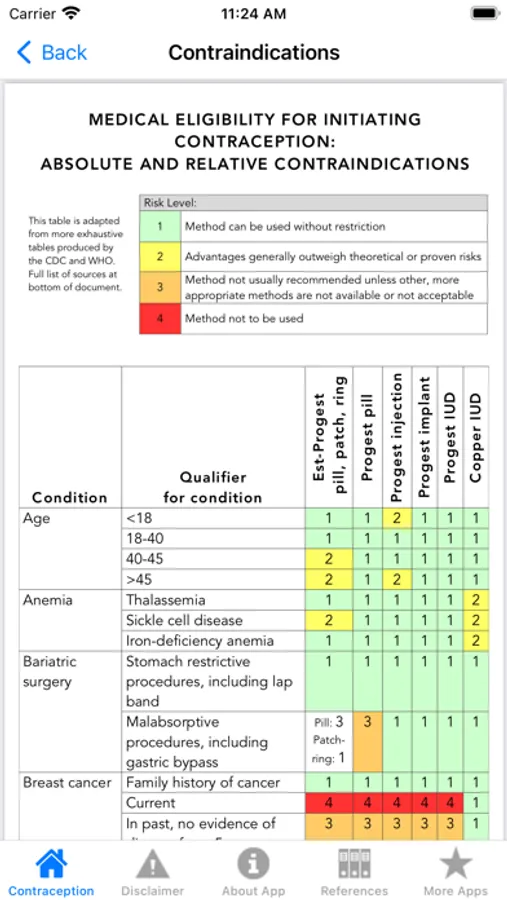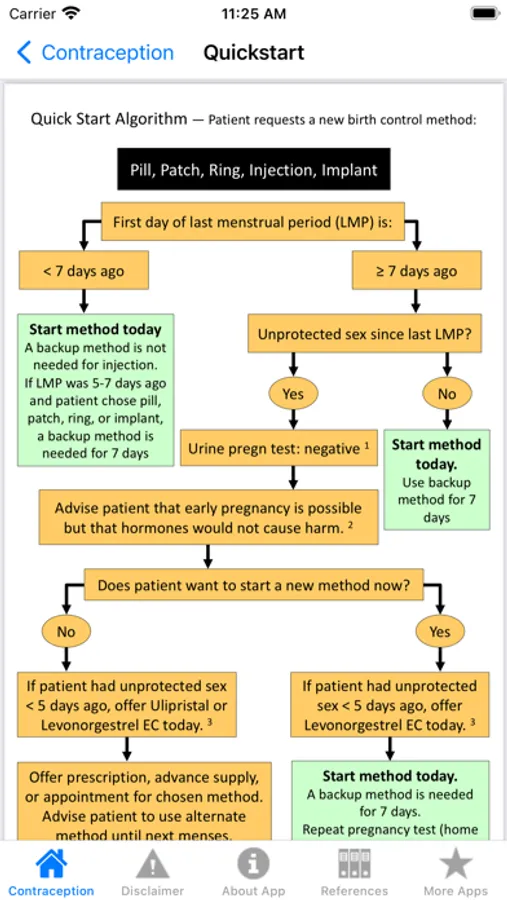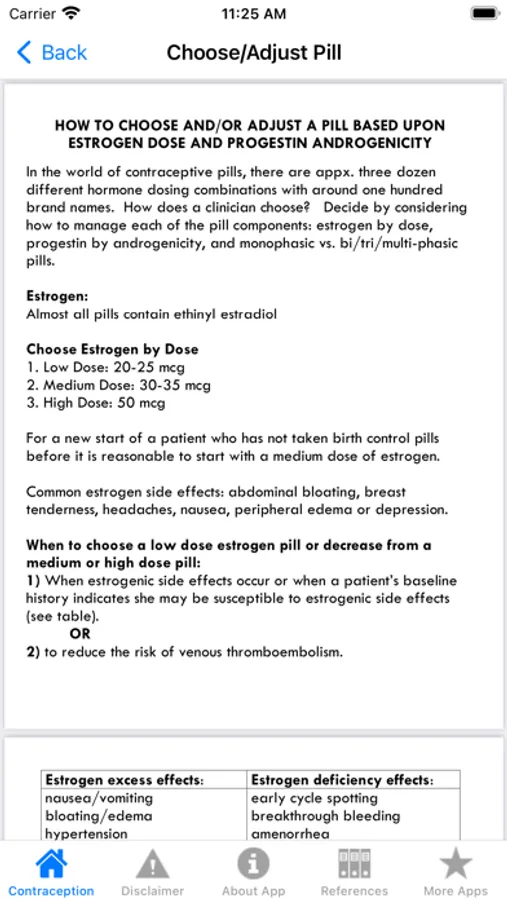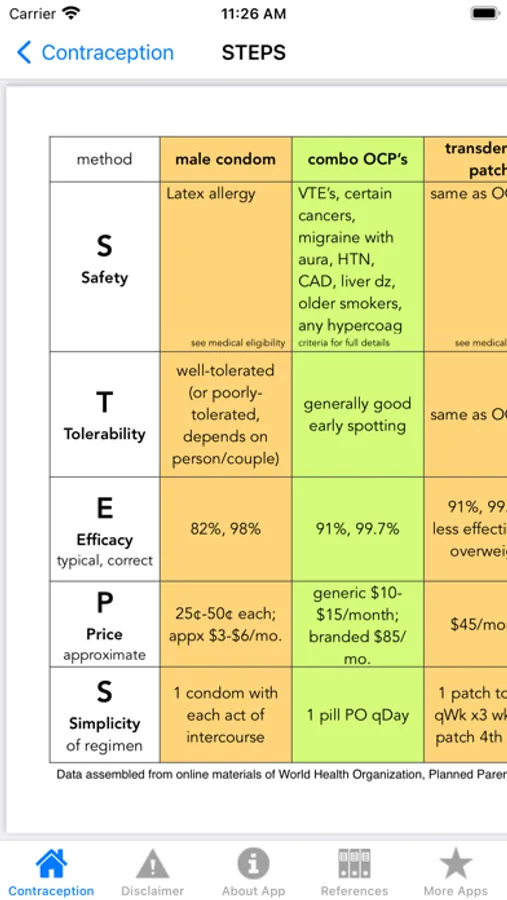Contraception Point-of-Care
United Health Services, Inc.
5.0 ★
18 ratings
Free
With this medical reference app, you can access guidelines on contraception provision and compare methods using the STEPS criteria. Includes eligibility tables, quick start algorithms, effectiveness data, and switching guidance.
AppRecs review analysis
AppRecs rating 4.5. Trustworthiness 0 out of 100. Review manipulation risk 0 out of 100. Based on a review sample analyzed.
★★★★☆
4.5
AppRecs Rating
Ratings breakdown
5 star
100%
4 star
0%
3 star
0%
2 star
0%
1 star
0%
What to know
✓
High user satisfaction
100% of sampled ratings are 5 stars
About Contraception Point-of-Care
Contraception Point-of-Care puts in clinicians’ and trainees’ hands a wealth of information to guide prompt and skillful provision of contraception care to women and couples. The app brings together information and guidance from Reproductive Health Access Project (RHAP), CDC, FDA prescribing information, and many other sources. The app is a collaboration between RHAP and UHS Wilson Family Medicine Residency faculty clinician Dr. Joshua Steinberg.
The app addresses such common questions as:
- can I start a patient on an IUD or Depo today? how?
- which birth control methods are unsafe for a patient with migraines? liver disease?
- what are various methods for emergency contraception and how do they compare?
- what are relative costs of each contraceptive option?
- do I have to overlap when switching from The Pill to Nexplanon? how?
- my patient is having breakthrough bleeding on her pill, how do I adjust the hormone doses?
- what are various natural family planning methods and how good are they?
- how can I compare all the available birth control methods? (STEPS criteria)
As the home screen screenshot shows, the resources in this app are: Medical Eligibility Criteria (contraindications) reference table, Quick Start Algorithms, table of Method Effectiveness, table of all OCP Formulations on the market and other non-pill hormonal formulations, guidance on How to Choose & Adjust OCP doses, STEPS criteria (safety, tolerability, efficacy, price, simplicity of regimen) for ALL contraceptive methods, focused STEPS comparative table for fertility awareness methods, focused STEPS comparative table for Emergency Contraception methods, guidance on how to switch methods, and a table of necessary exams and testing (prerequisites) before giving contraception.
This app is written and intended for practicing physicians like family physicians, internists, pediatricians, OB-Gyns, and women’s health clinicians of all kinds; and it is particularly useful for resident physician trainees and medical student trainees (and NP’s & PA’s) as they grow into expertise in contraceptive care. The app is NOT written for the lay public.
As an educator and clinician, I am interested in feedback and I would be grateful for guidance on improving the tool.
The app addresses such common questions as:
- can I start a patient on an IUD or Depo today? how?
- which birth control methods are unsafe for a patient with migraines? liver disease?
- what are various methods for emergency contraception and how do they compare?
- what are relative costs of each contraceptive option?
- do I have to overlap when switching from The Pill to Nexplanon? how?
- my patient is having breakthrough bleeding on her pill, how do I adjust the hormone doses?
- what are various natural family planning methods and how good are they?
- how can I compare all the available birth control methods? (STEPS criteria)
As the home screen screenshot shows, the resources in this app are: Medical Eligibility Criteria (contraindications) reference table, Quick Start Algorithms, table of Method Effectiveness, table of all OCP Formulations on the market and other non-pill hormonal formulations, guidance on How to Choose & Adjust OCP doses, STEPS criteria (safety, tolerability, efficacy, price, simplicity of regimen) for ALL contraceptive methods, focused STEPS comparative table for fertility awareness methods, focused STEPS comparative table for Emergency Contraception methods, guidance on how to switch methods, and a table of necessary exams and testing (prerequisites) before giving contraception.
This app is written and intended for practicing physicians like family physicians, internists, pediatricians, OB-Gyns, and women’s health clinicians of all kinds; and it is particularly useful for resident physician trainees and medical student trainees (and NP’s & PA’s) as they grow into expertise in contraceptive care. The app is NOT written for the lay public.
As an educator and clinician, I am interested in feedback and I would be grateful for guidance on improving the tool.
